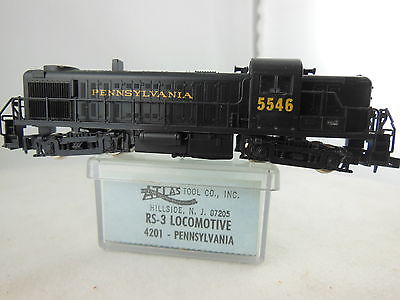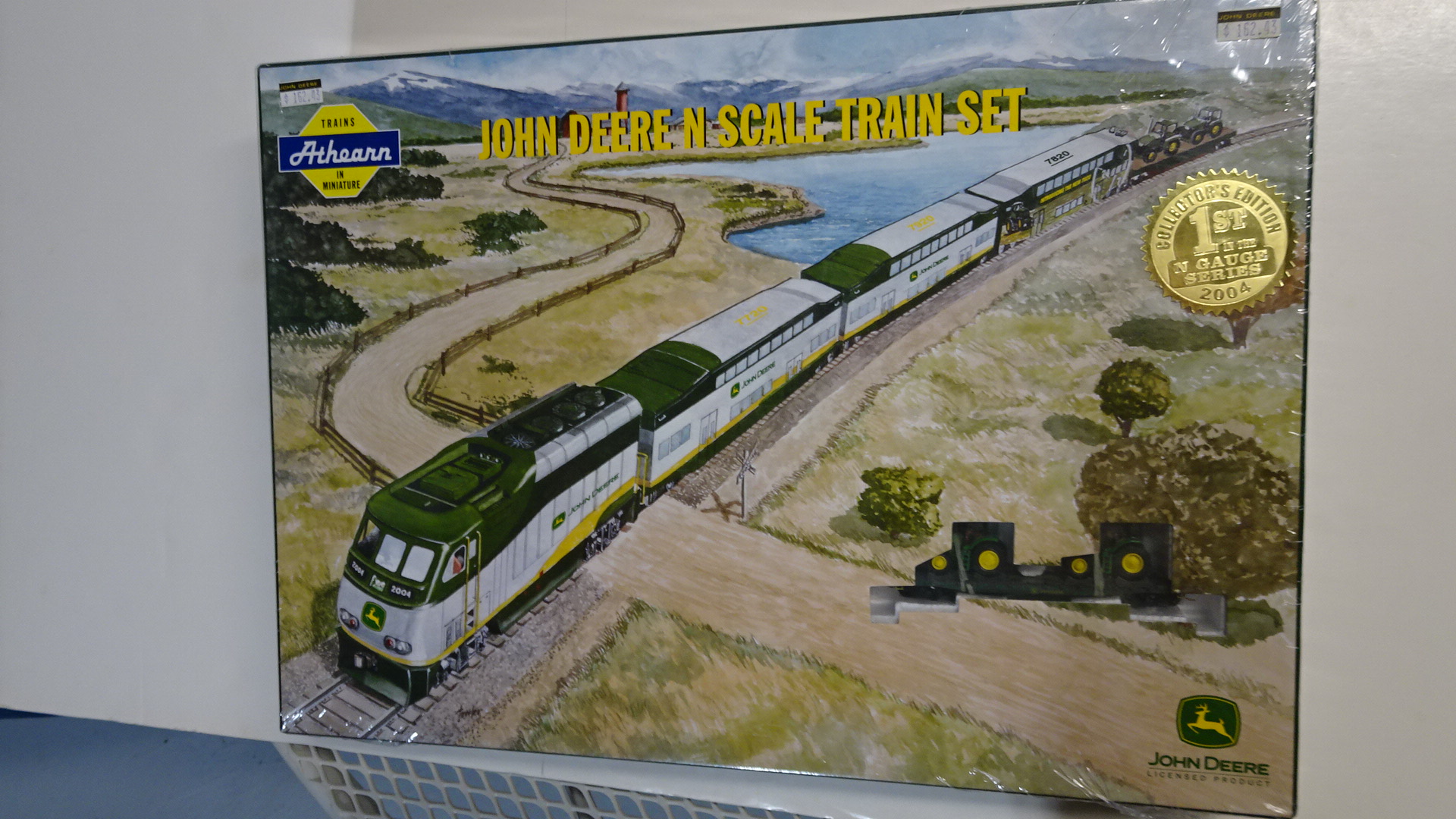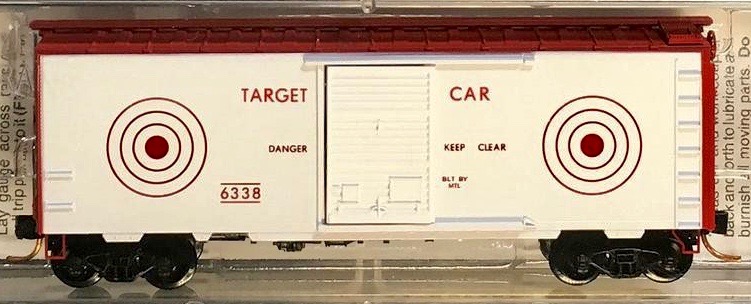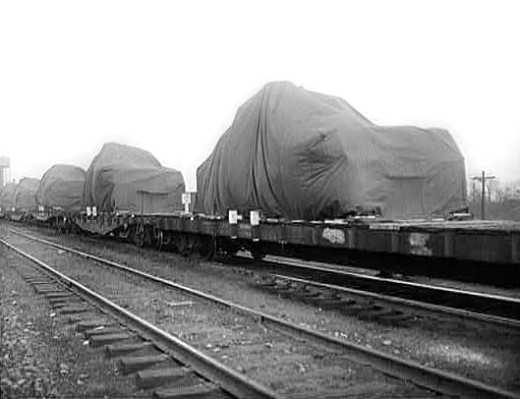Series Information: 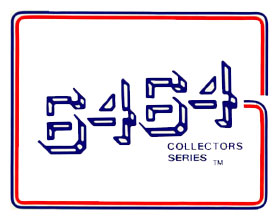 6464 Collector Series
6464 Collector Series
In the 1950′s and 60′s, most Lionel train sets included a boxcar. The common number ‘6464’ was printed on every car, regardless of the road name, and these cars have become a highly collected series for Lionel lovers throughout the world.
Lowell Smith commissioned Micro-Trains to reproduce these cars in N scale. He chose Micro-Trains because they are a company that, like Lionel, is a major brand name of trains that are both “collected and operated”.
This series began in 1995 and was projected to take seven years based on releasing six cars each year. The series was completed in 2002, as expected.
All cars were produced using the Micro-Trains 20,000 body style. At the end of the series, several “customer appreciation” sets were produced . Three locomotives and a caboose were released in conjunction with this series.
 6464 Collector Series
6464 Collector SeriesIn the 1950′s and 60′s, most Lionel train sets included a boxcar. The common number ‘6464’ was printed on every car, regardless of the road name, and these cars have become a highly collected series for Lionel lovers throughout the world.
Lowell Smith commissioned Micro-Trains to reproduce these cars in N scale. He chose Micro-Trains because they are a company that, like Lionel, is a major brand name of trains that are both “collected and operated”.
This series began in 1995 and was projected to take seven years based on releasing six cars each year. The series was completed in 2002, as expected.
All cars were produced using the Micro-Trains 20,000 body style. At the end of the series, several “customer appreciation” sets were produced . Three locomotives and a caboose were released in conjunction with this series.
Model Information: This model is Micro-Trains most popular flatcar. It models a 50 foot prototype. More than 140 different versions have appeared in Micro-Trains regular releases and many more in special runs.
Prototype History: A flatcar (US) (also flat car (US) or flat wagon (UIC)) is a piece of railroad (US) or railway (non-US) rolling stock that consists of an open, flat deck mounted on a pair of trucks (US) or bogies (UK), one at each end containing four or six wheels. Occasionally, flat cars designed to carry extra heavy or extra large loads are mounted on a pair (or rarely, more) of bogeys under each end . The deck of the car can be wood or steel, and the sides of the deck can include pockets for stakes or tie-down points to secure loads. Flatcars designed for carrying machinery have sliding chain assemblies recessed in the deck.
Flatcars are used for loads that are too large or cumbersome to load in enclosed cars such as boxcars. They are also often used to transport intermodal containers (shipping containers) or trailers as part of intermodal freight transport shipping.
From Wikipedia
Flatcars are used for loads that are too large or cumbersome to load in enclosed cars such as boxcars. They are also often used to transport intermodal containers (shipping containers) or trailers as part of intermodal freight transport shipping.
From Wikipedia
Road Name History: Micro-Trains sometimes makes fantasy cars using their own company name as the railroad name.
Brand/Importer Information: Micro-Trains is the brand name used by both Kadee Quality Products and Micro-Trains Line. For a history of the relationship between the brand and the two companies, please consult our Micro-Trains Collector's Guide.
Manufacturer Information:  Micro-Trains Line split off from Kadee Quality Products in 1990. Kadee Quality Products originally got involved in N-Scale by producing a scaled-down version of their successful HO Magne-Matic knuckle coupler system. This coupler was superior to the ubiquitous 'Rapido' style coupler due to two primary factors: superior realistic appearance and the ability to automatically uncouple when stopped over a magnet embedded in a section of track. The success of these couplers in N-Scale quickly translated to the production of trucks, wheels and in 1972 a release of ready-to-run box cars.
Micro-Trains Line split off from Kadee Quality Products in 1990. Kadee Quality Products originally got involved in N-Scale by producing a scaled-down version of their successful HO Magne-Matic knuckle coupler system. This coupler was superior to the ubiquitous 'Rapido' style coupler due to two primary factors: superior realistic appearance and the ability to automatically uncouple when stopped over a magnet embedded in a section of track. The success of these couplers in N-Scale quickly translated to the production of trucks, wheels and in 1972 a release of ready-to-run box cars.
Micro-Trains Line Co. split off from Kadee in 1990 to form a completely independent company. For this reason, products from this company can appear with labels from both enterprises. Due to the nature of production idiosyncrasies and various random factors, the rolling stock from Micro-Trains can have all sorts of interesting variations in both their packaging as well as the products themselves. When acquiring an MTL product it is very important to understand these important production variations that can greatly enhance (or decrease) the value of your purchase.
Please consult our Micro-Trains Collector's Guide

Micro-Trains Line Co. split off from Kadee in 1990 to form a completely independent company. For this reason, products from this company can appear with labels from both enterprises. Due to the nature of production idiosyncrasies and various random factors, the rolling stock from Micro-Trains can have all sorts of interesting variations in both their packaging as well as the products themselves. When acquiring an MTL product it is very important to understand these important production variations that can greatly enhance (or decrease) the value of your purchase.
Please consult our Micro-Trains Collector's Guide
Commissioner Information:  Desiring to bring a creative and artistic approach to model railroad cars, Lowell Smith Signature Series was born in 1994. The first special run car commemorated the Sesquicentennial (150th anniversary) of the Golden Spike - "Wedding of the Rails". Since 1994, Lowell Smith Signature Series has continued to produce over one hundred and thirty-five unique cars or train locomotives to date.
Desiring to bring a creative and artistic approach to model railroad cars, Lowell Smith Signature Series was born in 1994. The first special run car commemorated the Sesquicentennial (150th anniversary) of the Golden Spike - "Wedding of the Rails". Since 1994, Lowell Smith Signature Series has continued to produce over one hundred and thirty-five unique cars or train locomotives to date.
A native of Portland, Oregon, Lowell Smith married his church choir sweetheart Barb in 1978. After a lifetime of rail-fanning, Lowell and Barb ventured out in 1992 to launch a new business in Portland, Oregon.
Following Lowell's passion of model trains, The Hobby Smith was built to be the community center for model railroaders - operators and collectors alike. Located in the Hollywood District of Portland, The Hobby Smith was the place to learn and to enjoy the camaraderie of others with the same passion.
A native of Portland, Oregon, Lowell Smith married his church choir sweetheart Barb in 1978. After a lifetime of rail-fanning, Lowell and Barb ventured out in 1992 to launch a new business in Portland, Oregon.
Following Lowell's passion of model trains, The Hobby Smith was built to be the community center for model railroaders - operators and collectors alike. Located in the Hollywood District of Portland, The Hobby Smith was the place to learn and to enjoy the camaraderie of others with the same passion.
Item created by: CNW400 on 2020-12-06 11:43:42. Last edited by Alain LM on 2022-03-01 04:41:49
If you see errors or missing data in this entry, please feel free to log in and edit it. Anyone with a Gmail account can log in instantly.
If you see errors or missing data in this entry, please feel free to log in and edit it. Anyone with a Gmail account can log in instantly.





